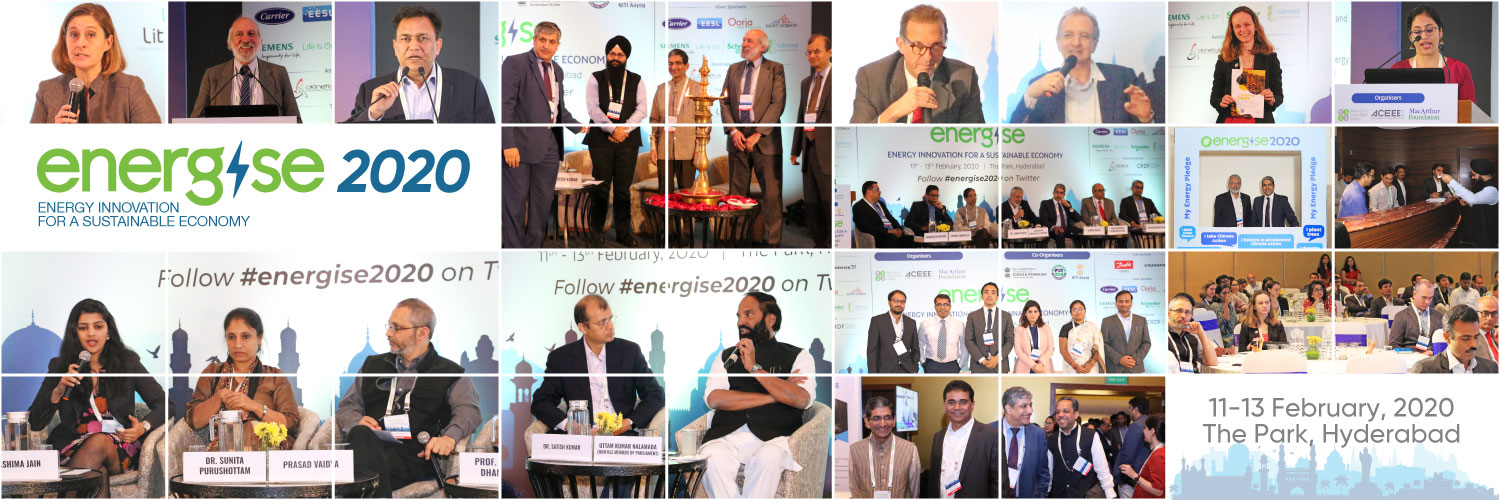
Hyderabad, February 13: The previous decade (2010-2020) was the decade of innovation and the next decade ahead of us (2020-2030) will be the decade of climate action. Energy efficiency can help reap significant climate action benefits to meet India’s commitment to the UN Sustainable Development Goals. However, we need to re-position energy efficiency within the larger context of energy transition.
To drive the broader narrative by shaping the future trends of energy efficiency in India, Alliance for an Energy Efficient Economy (AEEE) with support from MacArthur Foundation and American Council for an Energy-Efficient Economy (ACEEE) organised energise 2020: Energy Innovation for a Sustainable Economy, from 11-13 February 2020, in the vibrant city of Hyderabad. This conclave was prefaced with a pre-event on 10 February 2020. energise 2020 is the second edition of two such conferences; the inaugural conference INSPIRE was held in Jaipur in 2017.
AEEE designed the conference with the aim to offer an enabling platform for the torchbearers of energy efficiency and sustainability from three diverse stakeholder groups – the public sector, the private sector, and the civil society. The second reason for hosting the conference was to make high-value research and analysis available to larger audiences, to close the knowledge gap and in turn help in creating a knowledge repository for India to enable data-based decisions in policy-making and businesses.
With over 245 registered participants from India and abroad, 70+ speakers from 8 different countries, 40+ technical experts, the 4-day conclave was divided into numerous plenaries, panel discussions, round tables, 52 peer-reviewed paper presentations, and Technobuzz exhibition. Engaging discussions took place on topics ranging from energy transition strategies, Data-driven energy efficient policies, India Cooling Action Plan, Effective business models, e-mobility infrastructure, implementation EE policies in states, and Role of Partnerships to accelerate sustainable development.
The conclave saw sectoral participation from key government representatives and policymakers who shared the stage with businesses, civil society, students and academicians of energy and sustainability. Apart from this, global participation with representatives from Austria, France, Germany, Japan, Switzerland, Thailand, UK, and the United States was also witnessed during the conclave.
The conclave kicked off with a dedicated pre-day event on cooling that emphasized on the implementation of India Cooling Action Plan and synergies between the global cooling initiatives and India’s Cooling Coalition.
During his inaugural address, Dr. Satish Kumar, Executive Director and President, Alliance for an Energy Efficient Economy said, “It is important to prioritize energy efficiency as a resource and first fuel, to raise the quality of life of the most underserved to enhance the health, productivity and wellbeing of the people while being cognizant of emerging anddynamic challenges that greet us.”
In his special address, Anil Kumar Jain, IAS; Secretary Ministry of Coal, Government of India, focussed on how energy efficiency is as significant as renewable energy in India’s sustainable energy transition. He also reiterated the importance of transparency in public disclosure. His thoughts were echoed by Uttam Kumar Nalamada Reddy, Hon’ble Member of Lok Sabha and Standing Committees on Energy. In his address, and he said, “The concept of energy efficiency should reach every Indian and India must prioritize the use of energy more efficiently much like renewable.”
A culture of energy efficiency needs support from the larger innovation and technology community. Rajiv Kumar, Managing Director, Microsoft IDC and Corporate Vice President, E+D in his remarks said, “It is important to create technology that makes people’s live better for a sustainable planet.”
Technobuzz, the conclave’s business enablement space showcased innovative and smart models and technologies that can nudge India’s energy efficiency culture in India. The conference was kept sustainable in many ways with plantable seed calendars as promotional, canvas backdrops replacing flex, glass bottles replacing single-use plastic bottles, paperless proceedings, and an electric taxi fleet as a travel partner.
The conclave on its second day, launched India’s first Solar Decathlon, a collegiate competition where students design net-zero-energy-water-waste buildings and collaborate with industry partners to develop solutions that we urgently need.
The conference also noted private sector sponsors like Danfoss, Grundfos, Carrier, EESL, Oorja, Saint-Gobain, Siemens, Schneider Electric, Tabreed, cKinetics. Peer support was noted in CEPT University (CRDF), CEEW, CLEAN, NRDC and Prayas (Energy Group) and the conference received significant government and diplomatic support from Ministry of Environment, Forest & Climate Change, Department of Science & Technology (DST), Bureau of Energy Efficiency, Niti Aayog, and the British High Commission.




